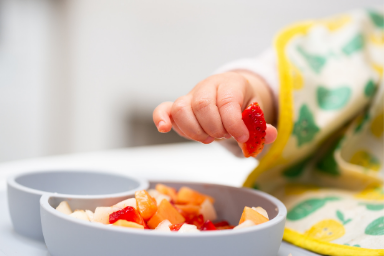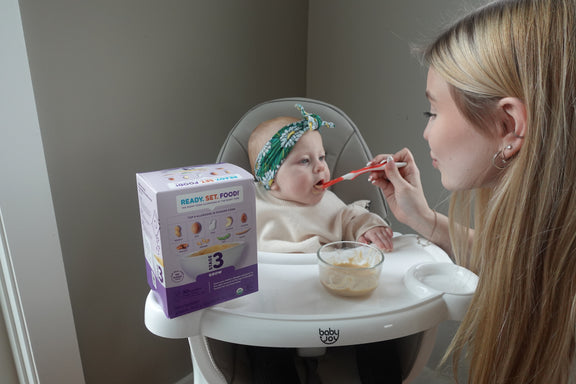Ready. Set. Food! is the only allergen-inclusive line of baby and toddler foods. Find out why we include our 9 top allergens to help set your baby up for a healthier future.
Top 3 childhood food allergies: Peanut, egg, and milk
As landmark clinical studies and key medical guidelines affirm, introducing common allergen foods early and often, starting in the first year of life, gives babies the best chance at a healthier future.
It makes the most sense to start introducing the foods responsible for the most childhood allergies first, so baby has a better chance at freely eating these foods later in life.
In babies and young children, milk, egg and peanut are responsible for around 80% of food allergic reactions. That's why Ready. Set. Food! Stages 1 and 2 focus on introducing these three top allergens. And since our Stage 1 and 2 Mix-Ins safely mix with breastmilk or formula, you can start introducing baby to peanut, egg, and milk as early as 4 months of age – even before they are ready for solids.
9 top food allergens among babies and toddlers
In total, 9 foods are responsible for around 90% of childhood food allergies.
Along with milk, egg, and peanut, these foods are:
After your little one is introduced to milk, egg, and peanut, Ready. Set. Food! Stage 3 Mix-Ins, Organic Baby Oatmeal, and Organic Puffs expand to include all 9 of the top allergens listed above. This promotes diet diversity and covers the foods responsible for 9 out of 10 childhood food allergies, to help set your little one up for a healthier future where they’re free to safely eat these foods.
(Stage 3 Mix-Ins and Organic Baby Oatmeal are designed for babies already eating solids, while our puffs and bars are meant for older babies and toddlers. Our Stage 3 Mix-Ins, Organic Baby Oatmeal and Organic Puffs contain 9 top allergens, while our Organic Oat and Fruit Bars contain 8 top allergens.)
Why doesn't Ready. Set. Food! include fish or shellfish?
Finned fish and shellfish allergies usually develop in adulthood. They are not common food allergies in young children. Ready. Set. Food! focuses on introducing the foods responsible for most childhood food allergies instead.
More about our 9 top allergens
Baby needs to be fed common allergen foods multiple times per week, over at least several months, for the best chance at food freedom.
With all the foods you’ll need to introduce, allergen introduction is tough to DIY. But Ready. Set. Food! is a much easier way to feed your baby 9 top allergens early and often.
Here’s more on the 9 top allergens and how Ready. Set. Food! can help you introduce them to your little one:
Peanut
- Peanut is a source of protein, healthy fats, and fiber.
- Prominent medical guidelines (NIH, AAP, AAAAI) recommend introducing peanut in the first year of life, starting as early as 4 months of age.
- Peanut can be tough to safely introduce on your own.
- You can’t feed baby whole peanuts, peanut pieces, chunky peanut butter, or unmodified smooth peanut butter, as they are choking hazards.
- Ready. Set. Food! makes introducing (and consistently feeding) peanut much easier and safer.
Egg
- Egg is packed with protein and Vitamin D.
- Prominent medical guidelines (NIH, AAP, AAAAI) recommend introducing egg in the first year of life, starting as early as 4 months of age.
- It’s super important to introduce egg early and often, as egg shows up in so many foods that kids (and adults!) love to eat. Egg is also “hidden” in many foods like pasta, mayonnaise, and even ice cream.
- Scrambled eggs and omelets are some ways to introduce egg, but many younger babies struggle to eat egg presented in these ways.
- It’s much simpler to introduce egg (and maintain exposure) with Ready. Set. Food!
Milk
- Cow’s milk is packed with protein and calcium.
- Cow’s milk allergy is the most common food allergy in infants and young children, so it’s extremely vital to keep giving baby cow’s milk foods.
- Cow’s milk shows up in so many foods that kids (and adults!) love to eat, and introducing it early gives baby the best chance at safely enjoying these foods later in life.
- Don’t give baby cow’s milk as a drink until after baby’s first birthday, as cow’s milk can’t properly replace the nutritional value of breastmilk or formula in baby’s first year.
- Instead, give baby milk as a food – as yogurt, as cheese, and in Ready. Set. Food!
Tree Nuts (Cashew, Almond, Walnut)
- Cashew, almond and walnut are sources of healthy fats needed for baby’s growth and development.
- Almond is also a source of protein and fiber.
- You can’t feed baby whole tree nuts, nut pieces, chunky nut butter, or unmodified smooth nut butter, as they are choking hazards.
- Ready. Set. Food! makes introducing (and consistently feeding) tree nuts much easier and safer.
Sesame
- Sesame contains healthy fats, important minerals, fiber, and protein.
- Sesame is a crucial allergen to introduce as it’s “hidden” in so many foods.
- Introduce and maintain exposure with thinned out tahini or Ready. Set. Food! products
Soy
- Soy contains proteins and essential amino acids.
- Like sesame, soy is a crucial allergen to introduce as it’s “hidden” in so many foods.
- Introduce (and maintain exposure to) soy with tofu, crushed/blended edamame, and Ready. Set. Food! products.
Wheat
- Wheat contains carbohydrates, fiber, and protein.
- Introduce (and maintain exposure to) wheat with Ready. Set. Food! products.
- You can also introduce wheat with whole-wheat bread or pancakes (modified to fit where your baby is at in their eating journey).

The Window Of Opportunity For Introducing Peanut: New Study Findings From the LEAP and EAT Trials
Results from the landmark LEAP and EAT studies have shown that intr...

Best Finger Foods For Babies (And When To Start Finger Foods)
When to move beyond the spoon and start baby's journey with finger ...

6 Reasons Why You Should Introduce Allergens
Landmark studies and medical guidelines recommend that you introduc...

7 Ways to Feed Your Toddler More Iron
Iron is an essential mineral for your toddler’s brain health and ov...

How To Know If My Toddler Is Getting Enough Protein?
Protein supports your toddler’s growth, helps build strong bones an...

How Much Milk Should Your Toddler Drink?
How much milk should your toddler drink in a day? Find out the reco...
All health-related content on this website is for informational purposes only and does not create a doctor-patient relationship. Always seek the advice of your own pediatrician in connection with any questions regarding your baby’s health.
These statements have not been evaluated by the Food and Drug Administration. Products are not intended to diagnose, treat, cure or prevent any disease. If your infant has severe eczema, check with your infant’s healthcare provider before feeding foods containing ground peanuts.






